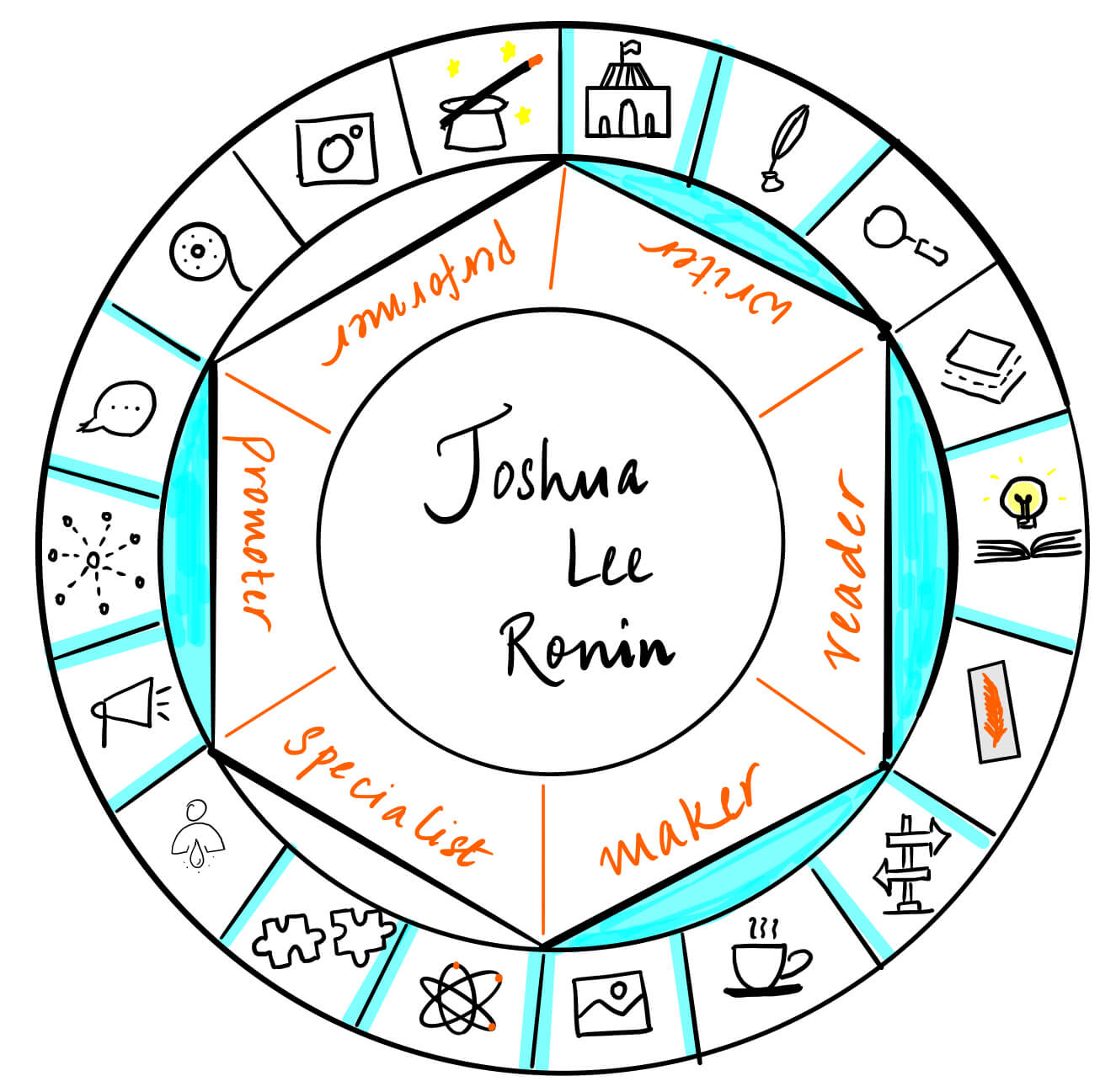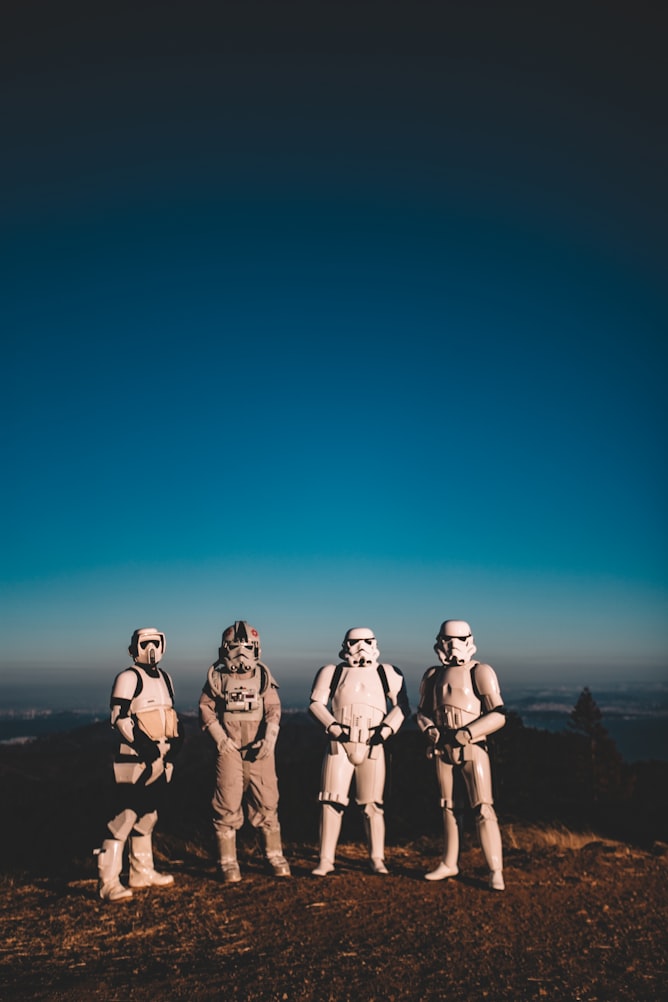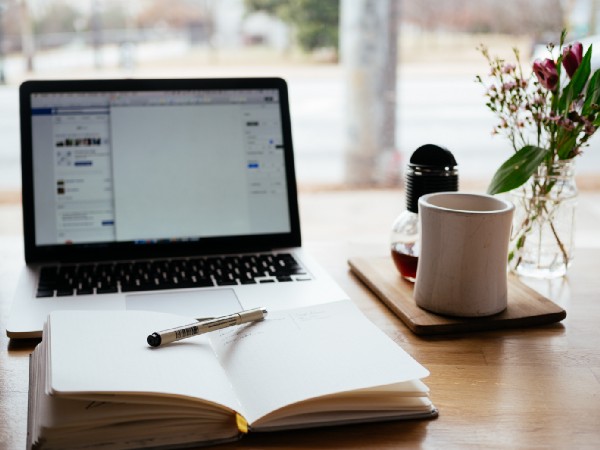
As important as it is to know that our family and peers have confidence in us, self-confidence in ourselves is vital for success in any pursuit. As a writer, self-confidence plays an even nuanced role that we might not recognize. To learn more about this, I have Joshua Lee Ronin on Creator’s Roulette today! As a science fiction and fantasy author, martial artist, military veteran, and podcaster, founder of WriteHive, a free and totally-online writing convention, he has much to offer and I’m sure you will learn something from his experience.
Joshua has been an amazing influence and guide in my life as a book blogger, always encouraging me and lending me an ear on difficulty topics. You might even remember him from my trigger warnings post earlier this month. As you read about his experience, think about your own journey in self-confidence – we would love to hear from you in the comments!
This is probably a ridiculous thing to hear from someone who wears a mask on the Internet: but self-confidence is key to literary success.
Usually, when I say that, people tune out. Of course, I totally understand why. Most of the people I interact with on a daily basis are people who don’t have much self-confidence to begin with. They’re people trying to lose weight who come into my gym with self-image issues or low self-esteem. They’re writers tucked away in their little, silent corners of the world, churning out books — most of which will never see the light of day (that’s the writers and the books) — hoping to find an audience that’ll validate their reclusiveness.
I’m surrounded by people who measure their whole lives on the yardstick of acceptance. Do people like me? Should they like me? … How could they possibly like me?
And that way of living typically leads to the foregone and unfortunate question: if no one likes me, and no one has a reason to, then why should I like myself?
The sad short answer is: because you’ll die if you don’t. The happy short answer is: because you @#$%ing can.
I’m not going to go on a long-winded diatribe about Maslow’s hierarchy or the neurochemical affects of self-love. There are a lot of people — a lot of experts — out there who can do that. But I am going to tell you my journey, and perhaps in so doing, I can impart a little something useful to you.
On Belonging

I wasn’t born in the place I’d like to die in. That is to say, I grew up in a part of the world that would have difficulty accepting me for who I am. Rural Ohio isn’t exactly the spot you check out for acceptance and inclusion. I was a queer kid with an open mind and a lot of big questions, and none of those things are particularly useful when you need to be tossing manure. Luckily, I found my way out of that area when I was young, and I traveled to a big city. Unluckily, it was a terrible city.
It took joining the military, going to war, suffering a divorce and a suicide attempt, battling addiction, and traveling the country in a van to finally find a place I felt I belonged, and it was only when I settled down into my new home — shoutout to Denver, Colorado — that I realized I’d been looking for the wrong thing my whole life.
I have never needed a place to belong. I have always needed to feel like I could belong.
And that’s an important distinction. We humans have this tendency to clique up. We look for places we can be, teammates we can trust, partners we can rely on. We look for the like-minded and the familiar. It’s a survival mechanism. Zebras don’t hang out with lions because lions are dangerous. Humans travel in “packs” because those close groups offer safety, comfort, and validation. (Validation, of course, being the highest form of non-physical safety.)
There’s nothing wrong with seeking out groups that will accept us. It’s a natural instinct. And sure, we could talk about how that instinct creates echo chambers or how grouping is inherently non-inclusive, but let’s table those topics for now and focus on something personal…
Finding people who love you will never be as powerful as learning to love yourself.
And I mean real love, here. Not that phony rom-com stuff. I mean the kind of love that is difficult sometimes. The kind of love that hangs on by a thread now and then, and feels just as powerful as it is fragile. The sort that you need to nurture and work for and never want to let go.

For some reason, social creatures that we are, we find it infinitely easier to love others more than ourselves. We also find it easier to accept love from others more than we accept love from ourselves. And maybe that’s because it feels better. A friend telling us we’re awesome just doesn’t feel quite as strong as looking in the mirror and saying, “You’re awesome.” Maybe we don’t want to be narcissistic. Maybe we just don’t like talking to ourselves in the mirror. Maybe we’re too close to ourselves to feel like we can have informed and objective opinions.
Or maybe being an ‘I’ is just terrifying as @#$%.
I spent my whole life looking for people to love me, and I never once considered that the love I really needed was in me the whole time. I joined organizations that might offer some sense of belonging. I took substances to numb the pain of being a human. I tried to end myself. I put all this energy and time and effort into looking for something that I could have been giving myself all along.
When I got to Denver, I finally found a place I felt I fit in. I found some friends. I joined in veterans and martial arts communities. I met people who appreciated and accepted my sexuality. And yet there was still this fear that I could lose those connections at any point. I had this pit in my stomach whispering untruths to me. That I wasn’t interesting enough. That I wasn’t skilled enough. That I wasn’t non-binary enough.
That I just… wasn’t… enough.
It’s taken a lot of therapy to help me realize that I am enough, and I think the biggest lesson I’ve taken away from it (okay, there are a lot, but still…) is this: I’m a human. I’m flawed, I’m unsure, I’m insecure. And all of that is perfectly normal. So is every other human being on this planet. Each of us suffer the same worries, the same setbacks, and the same pain. It’s what we choose to do with those things that define what type of person we are, but our type does not define our worth.
Some readers might find evidence to prove that incorrect. They might say, “Yeah, but there are people every day who say my ‘type’ of person is worth less than theirs.” And to that I shall reply: fine, but their opinion is theirs, and yours is yours. The words they say may be harmful. They may be painful. But those words have nothing to do with you, and they don’t have any control over who you choose to be. You are the only person feeling your feelings, and you are the only person who can choose how those feelings affect you. When someone says you aren’t worthy of love, it isn’t their words that make that true. It’s you believing those words that makes it true.
Moreover, your feelings are not who you are. They are just things you feel. The same way burning your hand doesn’t make you a burnt hand. It makes you a person with a burnt hand.
The distinction is subtle, but it’s important. If you’re having issues with self-confidence, I challenge you to ask yourself:
Do you wish to be an accepted person, or a person who can be accepted? Because you can fake who you are and still find acceptance. But you can’t fake who you truly are, and who we truly are is what really matters.
I run into this a lot when I talk to people about writing. So many writers out there are struggling to find acceptance because they don’t have any confidence in who they are. Naturally, they believe they’ll find confidence in themselves if others do first. So they put out books they don’t truly love, worried that what they really want to write couldn’t possibly be liked by other people. And then they get stuck and annoyed, frustrated with writing a book they don’t really want to write to appease people they don’t really want to appease. A book that doesn’t come from your heart might just find an audience, but is it really the audience you want? Wouldn’t you prefer to write something you love and have people love it too?
There’s a real vulnerability to being who you are. When you’re authentic, you’re bare. And when you’re bare, it seems like you’d get hurt easier. The haters’ comments seem like they’d damage you a lot worse. But I’ve found the opposite to be true. Rather than needing to put on armor and protect myself (and what I love) from the scathing assessments of people who disagree, I’ve found that authenticity has provided me with skin much thicker than any armor. And with that comes self-confidence.
Because I’m not wading into life’s battles hoping this armor I’ve put on will protect me. I’m walking confidently toward danger knowing that who I am can survive anything.
And as a martial artist, let me just say… the last person you want to fight is the person who isn’t afraid of getting hurt.
I don’t want to preach to you here about fear or how to avoid it. You shouldn’t avoid it. You should let it guide you. And I don’t want to tell you that what you’re doing is wrong. It isn’t. Whatever you’re feeling right now is valid, and all the reasons for it are valid too. But I do want to impress upon you how freeing and powerful self-confidence is, and I want to leave you with a tip to build it.
After all, this is all great in theory. Practice is much harder.
For The Writers
For you writers out there suffering from self-confidence issues that are leaving your writing career crippled, I invite you to consider what you truly love. What really moves you? And then I want you to ask yourself if your writing is feeding that or starving it. Are you writing stories that inspire you, motivate you, and uplift you? Are you writing stories that heal you? Are you writing stories that come from your heart and matter to you? And if not, why?

If you are writing those stories and you haven’t sent them out into the world yet, why? If you’re scared that someone won’t like it, do you truly think it’s possible to write a story that is universally loved by everyone? Here’s a quick spoiler: it isn’t. There are legitimately people out there right now who think Star Wars is garbage and Alice in Wonderland is terrible. There were publishers who turned away Harry Potter. High schoolers everywhere fall asleep reading Huckleberry Finn.
Does that make those stories bad? No. It just shows that there are lots of types of people. (Some of them have terrible opinions.)
Lean into the fear.
Welcome whatever pain might come from rejection or ‘Did Not Finish’es or 1-star reviews. Because here’s a secret: all those things are going to happen anyway. They’ve happened to every artist before you, they’ll happen to every artist after you, and it’s precisely those things that make you an artist to begin with.
If you want to build your self-confidence, get cozy with fear. Because here’s the funny, paradoxical thing about being one of those people who is always confident in themselves: they’ve gotten confident by being unconfident and doing the thing anyway. To build strength, you must often make yourself weaker (think of the soreness after lifting weights, for example). To be patient, you must suffer through situations that make you feel impatient. And to be confident, you must acknowledge that you aren’t confident at all.
When you do that, you give yourself the courage to be human. To be vulnerable. And you also allow your true self to shine through. When that happens, the light you give off will attract the others, and pretty soon you’ll find yourself surrounded by people who get it. And that will have come from you. The real you.
Not everyone is going to like your writing. Good. Let them have their opinions. Ultimately, they don’t matter anyway. They aren’t the intended audience. You can’t go around hoping to please those people. That way lies madness. You’ll make vanilla ice cream and some people will say they wanted chocolate. You make chocolate and others want strawberry. You make Neapolitan to please everyone, and that one guy — you know the one — is going to complain that there’s no banana.
That doesn’t mean you can’t win. It means they’re missing out on the cool stuff you’ve already made.
The best you can do is be you. It won’t be easy, I know. But it’s even harder trying to be someone else. Trust me, I’ve tried that.
Write what you love. What you genuinely, unabashedly love. Because if you write that and no one else loves it but you, at least one person loves it with all their heart. And honestly, most people seek out that kind of love their whole lives. You, my dear friend, can create it.
And that’s a superpower.
You wanna be self-confident? Be yourself. Let the haters miss out on the coolest person you know.
Much love! ❤️
What has been your journey in self-confidence?
Personally, my twenties have been a time of delving deeper into who I am and figuring out not just my values and beliefs, but also my place in the world. Whether it is going full on into a hobby or speaking up for myself, self-confidence has played a major role in the things I do. As I have spent more time with myself, I have learned to trust myself and my decisions more in all aspects of life. Joshua’s words are a great reminder to look back at when I need them!
Enjoyed this post about self-confidence? Connect with Joshua and stay connected to him in the following ways:
Find him online at joshualeeronin.com.

Stormtroopers group photo on Unsplash.
You are worthy of love photo on Unsplash.
Photo by Nick Morrison on Unsplash

Be First to Comment